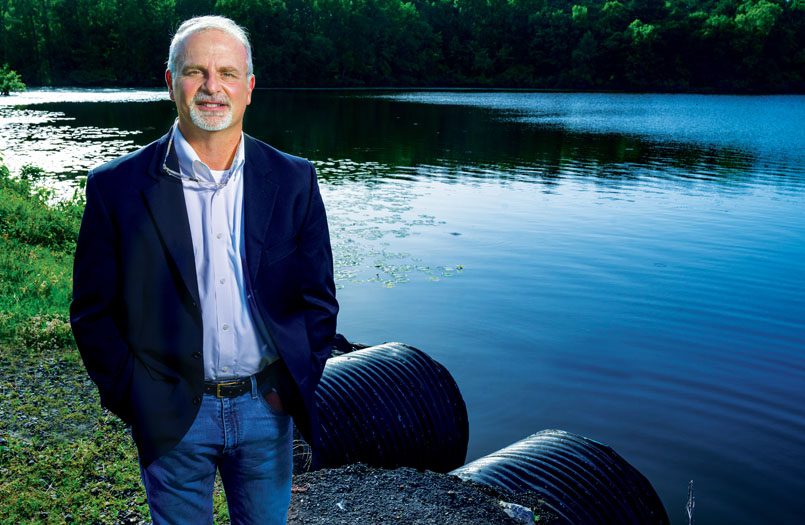30 Jun 2022 A look back at the Faulkner County dream team
By Donna Lampkin Stephens
Allen Dodson has believed in the value of teamwork practically his entire life. And early on in his judgeship, that belief was put to the test.
“I’m thankful we live in the United States of America,” he said, looking back on his baptism by fire shortly after he was appointed Faulkner County Judge on Jan. 31, 2013. He received the 23-month appointment from Judge Preston Scroggin, who resigned to become director of the Arkansas Livestock and Poultry Commission. Dodson never imagined that one of the largest disasters in Faulkner County history — the March 29, 2013 ExxonMobil oil spill in Mayflower — was about to happen on his watch.
Two months after assuming office, on Good Friday afternoon, he was driving to check on some roads in the southern part of the county and received a call from Faulkner County Office of Emergency Management Director Shelia Bellott notifying him of a break in ExxonMobil’s Pegasus pipeline. According to insideclimatenews.org, the breach was along “a defective 22-foot seam, spewing 210,000 gallons of heavy Canadian crude oil diluted with large quantities of harmful solvents.”
Dodson remembers asking Bellott, “How bad?” She didn’t know.

“I said, ‘It’s a big pipeline, so we’ve got to expect the worst,” he remembered, and he headed to the site of the spill, the Northwoods Subdivision along Lake Conway. Responders from the Faulkner County Road Department and Office of Emergency Management (OEM); the Mayflower police, fire, street and water departments; the Arkansas Department of Emergency Management; the Arkansas Game and Fish Commission and the Arkansas State Police began gathering.
“We needed to pull back and start thinking this thing through,” he remembered. “There was a lot of oil coming this way, a little over 3,500 barrels eventually.”
The oil was coming from a cove, and the responders were able to block it through two four-foot culverts, keeping it from contaminating greater Lake Conway.
“Sand was going to be difficult, so we looked at the city street department and asked them, ‘Do you have any gravel?’ They were already building dikes,” Dodson said. “It was 100 percent a partnership from the beginning, just the plugging of the oil into the cove and preventing it from getting into the lake.” Local officials plugged the culverts and trapped the oil in the cove within a couple of hours. Dodson called it “a massive win for Faulkner County.”
The cleanup, on the other hand, took several months and more collaboration through the National Incident Management System. “The Incident Command System provides protocol and roles and procedures and allows you to build an organization and scale disaster response rapidly,” Dodson said. “We had approximately 650 responders at the peak.”
The unified command system comprised four entities: federal, state, local and the private responsible party. For the oil spill, the Environmental Protection Agency (EPA) took the lead for the federal government, Arkansas Department of Environmental Quality (ADEQ) for the state, Faulkner County OEM for local and ExxonMobil as the private entity.
“I was the local on-scene coordinator,” Dodson said. “Typically, the local government tends to pull back, but I knew the people were going to trust their local government. That was apparently the first time the local level had stayed involved. Usually they step back to the ADEQ and EPA, but we saw that value there and wanted to keep our head under the hood so we could tell the people of Mayflower and Lake Conway what was going on every bit of the way. We knew they’d trust us.”
He had gone through Unified Command Training shortly after taking office.
“Virtually everyone who goes through that training wonders how you’re going to make that work, with all those allegiances, but we made it work, and it worked really well,” he said. “The cleanup didn’t come to an impasse.” Before it was over, Dodson said, every department of county government, as well as the Arkansas Department of Health and Mayflower Public Schools, was involved.
As a seventh-generation Faulkner County resident, Dodson’s roots run deep in the 501. The extended family maintains his great-grandfather’s farm along the Arkansas River. As an appointee, Dodson was ineligible to run for a full term in the 2014 election. After a stint in private law practice, he has been the Lonoke County Attorney for five years.
Nine years after that Good Friday call, he remains proud of the teamwork he witnessed. And, remarkably, 13 months later he witnessed it again when another disaster — this time a devastating tornado — swept through Mayflower and Vilonia.
In the case of both the oil spill and the tornado, said Dodson, “I couldn’t be more proud of the city of Mayflower, Faulkner County, the state of Arkansas and all the agencies, You can’t get a response that quickly and that effectively without all that teamwork from those who’ve developed the system through the decades.”
- Dental professionals volunteer, brightening the smiles of thousands - June 30, 2025
- A wiser Kiser - May 5, 2025
- Nickalas and the bearded dragons - March 1, 2025











